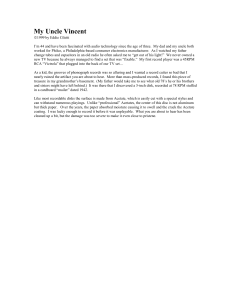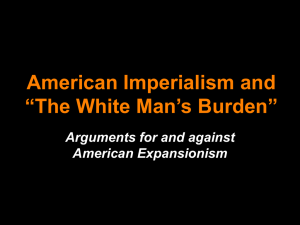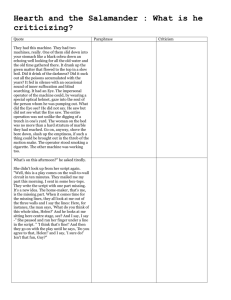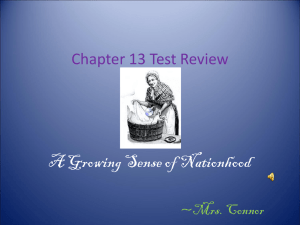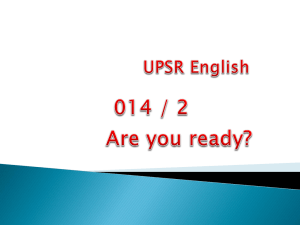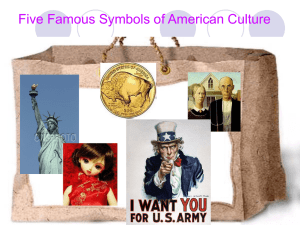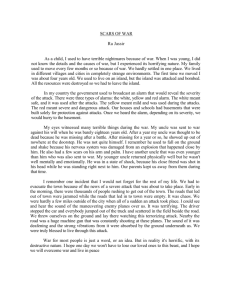The Uncle Speaks in the Drawing Room by Adrienne Rich
advertisement
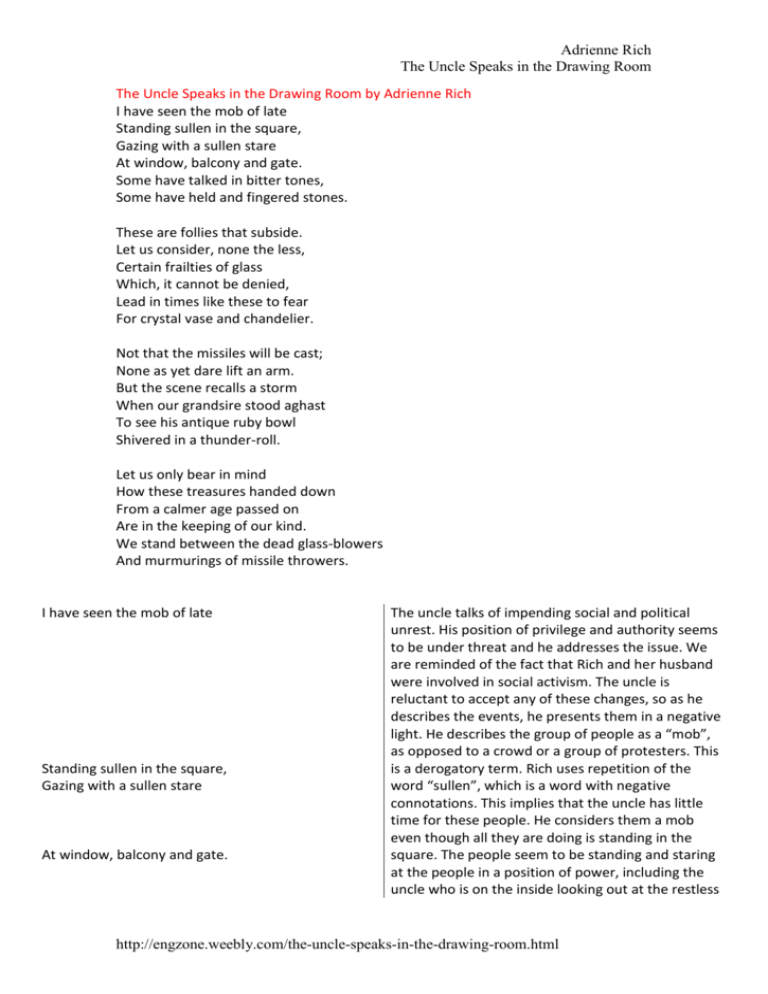
Adrienne Rich The Uncle Speaks in the Drawing Room The Uncle Speaks in the Drawing Room by Adrienne Rich I have seen the mob of late Standing sullen in the square, Gazing with a sullen stare At window, balcony and gate. Some have talked in bitter tones, Some have held and fingered stones. These are follies that subside. Let us consider, none the less, Certain frailties of glass Which, it cannot be denied, Lead in times like these to fear For crystal vase and chandelier. Not that the missiles will be cast; None as yet dare lift an arm. But the scene recalls a storm When our grandsire stood aghast To see his antique ruby bowl Shivered in a thunder-roll. Let us only bear in mind How these treasures handed down From a calmer age passed on Are in the keeping of our kind. We stand between the dead glass-blowers And murmurings of missile throwers. I have seen the mob of late Standing sullen in the square, Gazing with a sullen stare At window, balcony and gate. The uncle talks of impending social and political unrest. His position of privilege and authority seems to be under threat and he addresses the issue. We are reminded of the fact that Rich and her husband were involved in social activism. The uncle is reluctant to accept any of these changes, so as he describes the events, he presents them in a negative light. He describes the group of people as a “mob”, as opposed to a crowd or a group of protesters. This is a derogatory term. Rich uses repetition of the word “sullen”, which is a word with negative connotations. This implies that the uncle has little time for these people. He considers them a mob even though all they are doing is standing in the square. The people seem to be standing and staring at the people in a position of power, including the uncle who is on the inside looking out at the restless http://engzone.weebly.com/the-uncle-speaks-in-the-drawing-room.html Adrienne Rich The Uncle Speaks in the Drawing Room Some have talked in bitter tones, Some have held and fingered stones. These are follies that subside. Let us consider, none the less, Certain frailties of glass Which, it cannot be denied, Lead in times like these to fear For crystal vase and chandelier. Not that the missiles will be cast; None as yet dare lift an arm. But the scene recalls a storm When our grandsire stood aghast To see his antique ruby bowl Shivered in a thunder-roll. Let us only bear in mind How these treasures handed down From a calmer age passed on Are in the keeping of our kind. We stand between the dead glass-blowers And murmurings of missile throwers. people. The crowd is described as talking in bitter tones, again a term with negative connotations. They are not angry, but bitter. The crowd would appear to be contemplating violent action, but as of yet have not engaged in such actions. The uncle tries to dismiss these actions as the mistakes of the lower orders of society. The use of the word “follies” is significant - it subtly characterises the uncle as upper class. In becomes clear that the flippant dismissal of the protesters seems to be a bit of a façade. While dismissing any notion of trouble, he is also conceding that precautions need to be taken and in the next few lines details how some material possessions could be damaged if there is unrest. The material possessions mentioned are possible symbols of wealth and status in society. Perhaps Rich is being quite clever here - she may be suggesting that their power is as fragile as the glass they are trying to protect. The uncle’s priorities reveal how materialistic this class is. He is very mindful of the fact that there is glass in the houses that can be broken. The objects mentioned, such as crystal vases and chandeliers, are objects of the rich. The uncle displays more arrogance in the face of the social unrest. There is a certain bravado/machismo in his speech as he tries to rally and dismiss yet again the notion of a threat. One senses, however, that these are merely empty words on the part of the uncle. His fears come to the surface once more, belying his bravado and underscoring the threat that really exists. The focus again falls on material possessions and family objects that are the symbols of power. There is a subtle hint here of some unrest in the past. The uncle refers to it as a storm, and one wonders whether it is a physical storm or a social and political storm he is referring to. Once more the uncle tries to rally and falls back on the traditional notion tradition as a means of protecting power and privilege. He states that it is his and his class’s responsibility to keep the torch lit for the upper class. However, it seems to be little more than empty rhetoric and is a weak argument for preserving privilege. They are the last line of defence between their great ancestors and the unruly mob that will destroy them. http://engzone.weebly.com/the-uncle-speaks-in-the-drawing-room.html Adrienne Rich The Uncle Speaks in the Drawing Room Common Ground: Aunt Jennifer’s Tigers / The Uncle Speaks in the Drawing Room Style of writing Formal traditional approach Stanza structures Rhyming scheme Both poems written early in writing career Approach to poem Both are political statements AJT: A little more personal and public Uncle: more overtly political Named aunt Jennifer - personal The uncle - impersonal - realm of public Aunt Jennifer’s Tigers clearly discusses feminist issues Uncle - more general political issues, but still underlying feminist agenda less explicitly http://engzone.weebly.com/the-uncle-speaks-in-the-drawing-room.html
